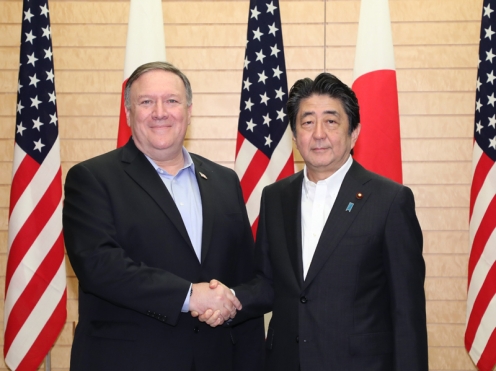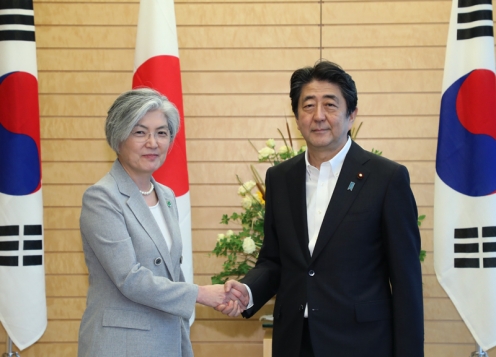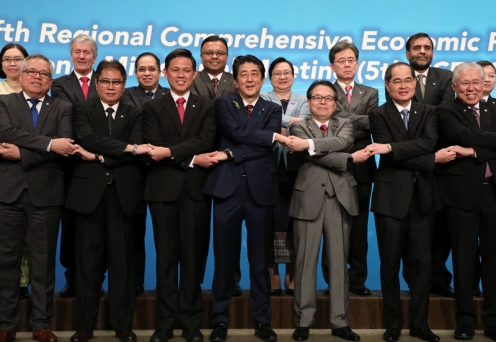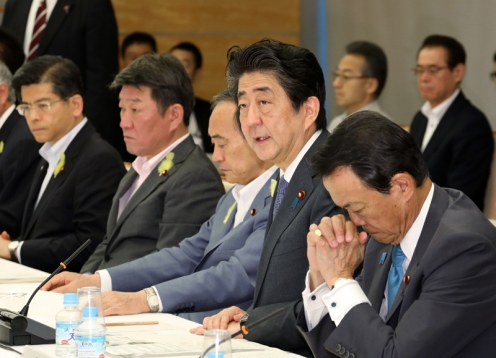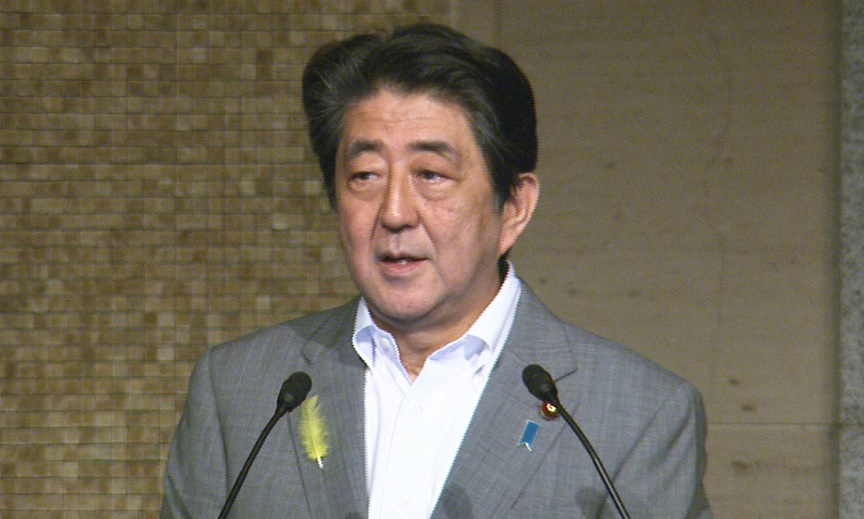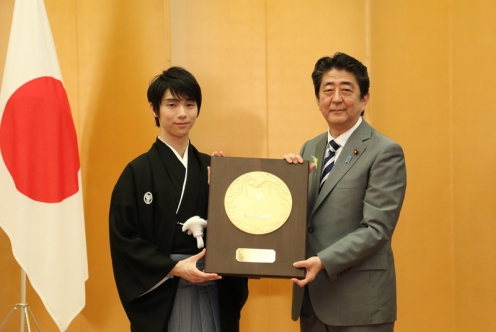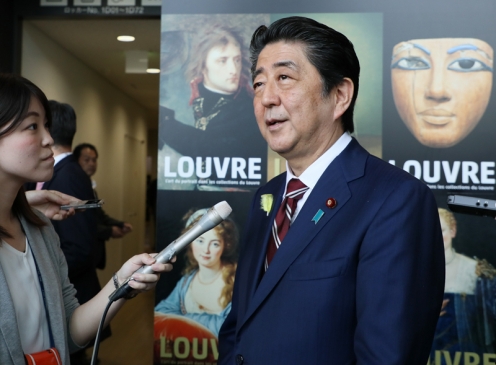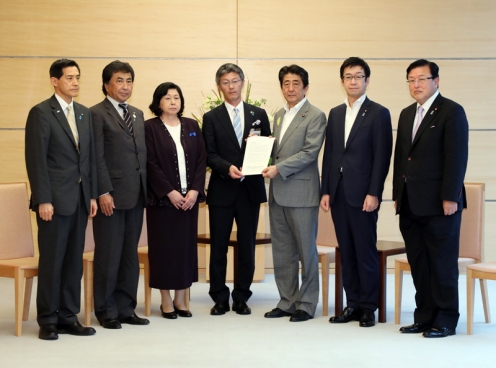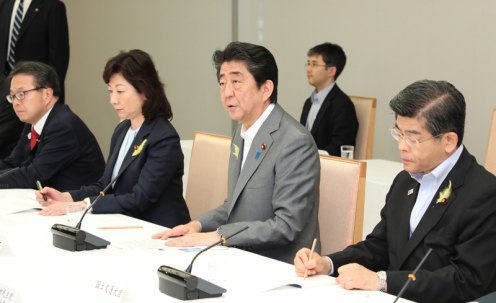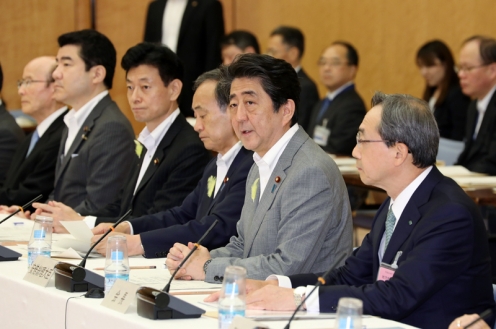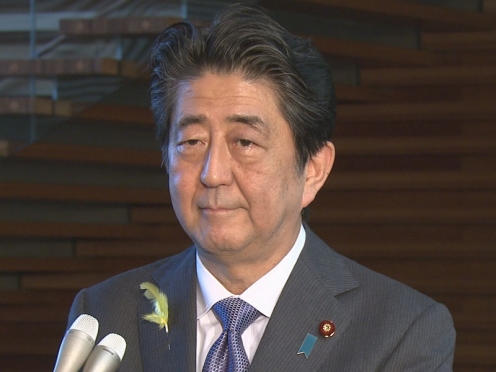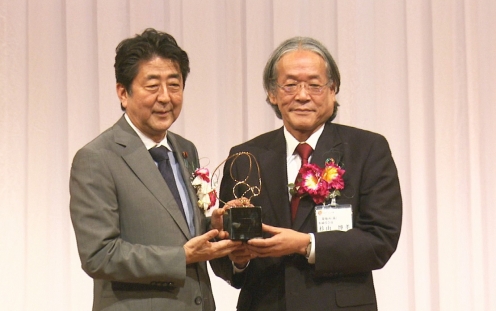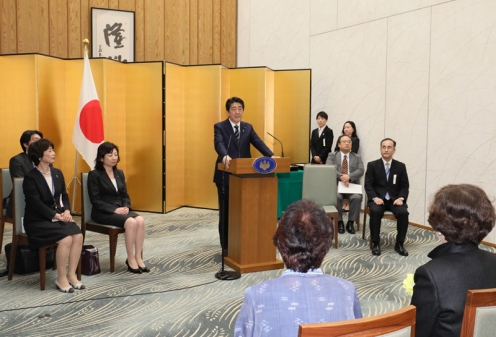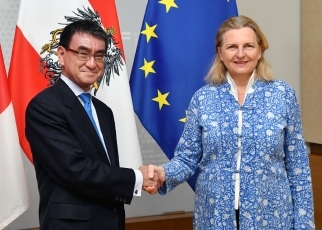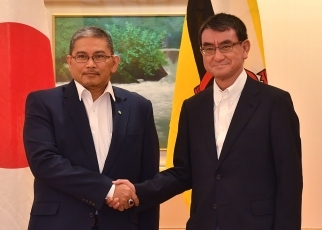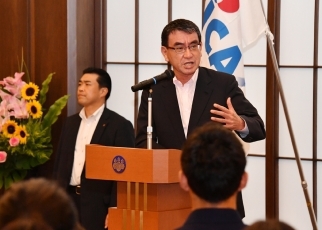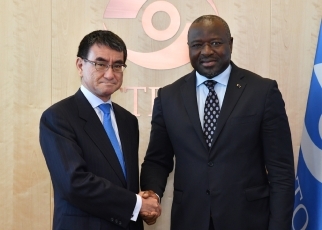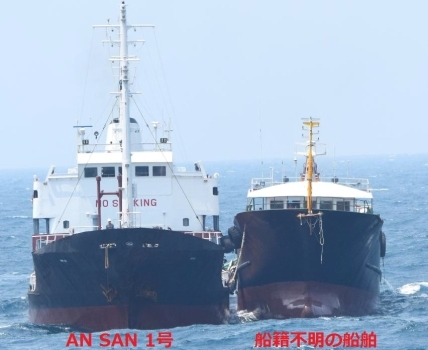Courtesy Call from the Secretary of State of the United States
Cabinet Secretariat, Sunday, July 8, 2018
[Provisional Translation]
On July 8, 2018, Prime Minister Shinzo Abe received a courtesy call from the Honorable Mike Pompeo, Secretary of State of the United States of America, at the Prime Minister's Office.
Courtesy Call from the Minister of Foreign Affairs of the Republic of Korea
Cabinet Secretariat, Sunday, July 8, 2018
[Provisional Translation]
On July 8, 2018, Prime Minister Shinzo Abe received a courtesy call from H.E. Dr. Kang Kyung-wha, Minister of Foreign Affairs of the Republic of Korea (ROK), at the Prime Minister's Office.
RCEP Intersessional Ministerial Meeting
Cabinet Secretariat, Sunday, July 1, 2018
[Provisional Translation]
On July 1, 2018, Prime Minister Shinzo Abe attended the Fifth Regional Comprehensive Economic Partnership (RCEP) Intersessional Ministerial Meeting held in Tokyo.
Council for Central Disaster Management
Cabinet Secretariat, Friday, June 29, 2018
[Provisional Translation]
On June 29, 2018, Prime Minister Shinzo Abe held the 38th Council for Central Disaster Management at the Prime Minister's Office.
During the meeting, the revision of the Basic Disaster Management Plan was approved, and there were reports on the partial revisions to the Disaster Relief Act and other related matters.
In response to the approval and reports at the meeting, the Prime Minister said,
“Firstly, I would like to, once again, express my heartfelt condolences to those who lost their lives, and my sympathies to everyone affected by the earthquake centered in northern Osaka Prefecture, which occurred on the morning of June 18. I also express my respect to all the hard work that the members of this Council have done from your respective positions in response to the earthquake. I would like the relevant ministers to continue to exert every effort for recovery and reconstruction so that those affected by the earthquake can return to their daily lives as they were before at the earliest possible date. At the same time, I want you to swiftly implement responses to the issues that have become clear this time, such as measures to protect the safety of children.
In this revision of the Basic Disaster Management Plan, we included various measures incorporating lessons learned from our recent efforts such as measures to ensure the evacuation of people requiring special attention and prevent people from being left behind as well as flood-control measures to prevent damage from landslides, and driftwood to small and medium sized rivers, and smooth provision of personnel support for disaster-affected areas, especially the arrangement to dispatch disaster-response management personnel, including medical staff, and collaborations among municipalities affected by the disaster. I would like each minister to continue to steadily promote the further enhancement and improvement of disaster management and mitigation measures based on the outcomes approved today.
A moment ago, we have just received information about a record-breaking deluge in a short period in Fukuoka. There are concerns over potential disasters caused by heavy rain around the end of the rainy season. Please work diligently on these situations with a sense of urgency.
The Government continues to implement comprehensive disaster management measures in both hard and soft dimensions, holistically, through joint efforts of the public and private sectors. I would like to ask the members of this Council for your further understanding and cooperation on this matter.”
Remarks by H.E. Mr. Shinzo Abe, Prime Minister of Japan, at the Symposium “Shared Values and Democracy in Asia”
Cabinet Secretariat, Thursday, July 5, 2018
[Provisional translation]
Good evening, ladies and gentlemen. I am Shinzo Abe.
I wish to share some thoughts with you here in closing the symposium “Shared Values and Democracy in Asia.”
This is the fourth of our symposium. I join you all in applauding its continuity.
Ours is an especially unique venue for discussions. It is not only unparalleled anywhere in the world but also unmatched at any other time in history.
It has its beginnings in a proposal Prime Minister Narendra Modi of India and I made jointly when he visited Japan four years ago in the autumn.
Prime Minister Modi once again kindly provided a message to us here. He and I are both highly gratified that the symposium continues to be held.
Allow me to revisit with you the reason we launched this seminar.
The nation that has held democratic elections regularly at the largest scale in human history and, right up to the present day, has steadily followed through on its electoral outcomes each and every time is none other than India.
I was for a long time quite in awe of this fact.
And yet Prime Minister Modi understood that democracy is not something that comes to flourish through just chance.
I too shared that same understanding.
Democracy is of course something that develops only over the course of decades -- or rather, over the course of generations.
This year Japan commemorates the 150th anniversary of the Meiji Restoration.
One hundred and fifty years ago, as the new nation was being formed, the first article of the five-article oath taken by His Majesty at the time was that, “The practice of discussion and debate shall be universally adopted, and all measures shall be decided by public argument.”
Since that time until the present day, we have continued to walk what is, if we think about it, an unending path while we formed and fostered our democracy, facing various trials regarding it.
Is democracy not just like a tree that takes many long years to mature? In order to grow it must extend its roots deep down into the ground.
Moreover, as it is not a fast fashion T-shirt, democracy isn’t something you can just take straight off the rack.
In this world, it is very hard to come by democracy that really fits no matter who dons it, from size to design.
Invariably, democracy is something that has to be tailor-made to the national character if it is to take root, and even then, getting those roots firmly set takes a great long time.
That said, ultimately, there is no other system that can replace democracy.
If that is the case, then wouldn’t it be ideal to have a place where at least once a year, from all around Asia, people can bring their knowledge and experience about how to foster democracy -- their thoughts or even their worries!
It was from there that the concept underlying this seminar first came into being.
Democracy not as a “foreign species” introduced from the West. Democracy that is spoken of not in translation, but through our native words and concepts.
What could it be like? It was something we decided we wanted to discuss further.
So how do we foster our own democracy?
The issues involved in that vary with the country and the era.
One thing is certain no matter the era or the circumstances: the foundation of democracy lies in people's hearts.
In Myanmar, which is democratizing, the complete revision of elementary school textbooks is now underway.
People in the government of Myanmar decided that they wanted to foster in children’s minds from an early age their ability to pose questions and then work out solutions by themselves -- that is, the ability to think.
I regarded this as an endeavor equivalent to building future human resources, who will shoulder efforts to cultivate democracy and make it into something good.
Looking at it in that way, I became rather solemn in my reflections.
That was because a great number of Japanese experts were already in Yangon to assist with the complete revision of the textbooks, through the efforts of the Japan International Cooperation Agency, or JICA.
It was because they have been working together with educators in Myanmar over the course of several years.
In the 150th anniversary year of the Meiji Restoration, Japan has been successfully assisting with Asian nation-building and with forming the foundations for democracy.
Had they known, our now-deceased ancestors who carved out the Meiji-era world would, I’m sure, also feel they were well rewarded.
I believe that Japan must continue to make efforts going forward so that it remains a country able to enjoy this kind of trust.
Today we are joined by Professor Sengaku Mayeda and other experts from the Eastern Institute.
I am greatly reassured by the fact that the work of the late Professor Hajime Nakamura has been handed down to a new generation through The Eastern Institute and The Eastern Academy, both of which he himself founded.
Professor Nakamura was well versed in Sanskrit, Pali, Tibetan, English, German, Greek, and French.
I understand he authored 1,186 books and articles in Japanese and as many as 300 in English and other Western languages. And I hear that this is only what they have been able to identify thus far.
His achievements are really amazing. I am proud simply to have breathed the air in the very same era of a person of such great learning, who was a truly great man in this way.
Over the course of his work, he gave deep thought to “compassion,” which both Buddhism and Indian ideologies advocate.
It seems that “compassion” has several possible word origins, including the Sanskrit word “karunā.”
Professor Nakamura explained that within the roots of ideologies that value “compassion” is the thinking that oneself and others are not different, but in fact the very same.
There are, from the first, no differences in social rank or hierarchy and there is no such thing as superior or inferior. There is also no single Absolute prominently projecting itself ahead of others who all fall equal. Right from the start, all are the same; all are equal.
That is the view of human beings, inherent to that “compassion.” My understanding is that was Professor Nakamura’s thinking on the matter.
The people pushing ahead with the Meiji Restoration were the youth of the day. Most were samurai, but from the lower echelons of that rank, far from privileged.
The idea that both you and I -- indeed, everyone -- is equal is a concept they at that time embraced naturally.
We can imagine that that is what channeled the undulations of reforms towards the establishment of an assembly that took the principle of one person, one vote.
It is also possible to find here one of the sources of our feeling, handed down continuously in modern Japan, that what we should deplore is not poverty but inequality.
I believe the lands of Asia seem to contain a rich variety of the nourishing food and the minerals needed to cultivate democracy.
On that fact, our symposium shines a light and promotes our own self-awareness. My congratulations to the successful completion of this year's symposium. I would like to end my remarks with my sincere wishes that in future years the discussions here will go deeper still.
Thank you for listening.
Presentation of the People’s Honor Award
Cabinet Secretariat, Monday, July 2, 2018
[Provisional Translation]
On July 2, 2018, Prime Minister Shinzo Abe held a ceremony to present the People’s Honor Award at the Prime Minister’s Office to Mr. Yuzuru Hanyu, and conferred upon him the certificate of award and the shield.
Mr. Yuzuru Hanyu achieved the historic feat of being the first Japanese person to win two consecutive winter Olympic singles championships, as well as the first male figure skater in 66 years in the entire world to win two consecutive Olympic men’s singles championships in the designated games. He realized the remarkable accomplishment of bringing dreams and wonderment to many Japanese people, and giving society bright hope and courage.
The People’s Honor Award recognizes Mr. Yuzuru Hanyu for such an accomplishment.
The People’s Honor Award was established in August 1977 to honor individuals respected by a broad spectrum of the people, and whose distinguished achievements have brought the light of hope to society.
Launch Celebration for “Japonismes 2018: les âmes en resonance”
Cabinet Secretariat, Monday, July 2, 2018
On July 2, 2018, Prime Minister Shinzo Abe attended a Launch Celebration for “Japonismes 2018: les âmes en resonance (the souls in resonance)” held in Tokyo.
The Prime Minister said in his opening address,
“Thank you all very much for taking time out from your busy schedules to attend the send-off party to celebrate the opening of Japonismes 2018.
As the World Cup matches always take place at a late hour, I have recently been suffering from a slight lack of sleep, and I am also wishing they would hold the matches at a more convenient hour. At the same time, I have also been impressed with the great victory of France against Argentina. I have a plan here: if Japan were to win against Belgium tomorrow, and further, win against Brazil as well, we would then meet France at the semi-finals. Furthermore, if Japan were to win in the semi-finals, we would eventually enter the finals.
Anyway, we have finally reached the last 10 days before the opening of Japonismes 2018 on July 12. Standing before all of you present here today, who are working on the frontlines of your respective fields, it fills me with immense pride.
I would like to express my heartfelt gratitude to all the parties involved in the preparations thus far, all the companies that have offered their cooperation, as well as to all our counterparts from France, who have supported the concepts of Japonismes 2018 and the 160 years of friendship between Japan and France and worked together to prepare for this event.
Japan’s culture ranges from ancient culture, represented by the brilliant and vivid formative art expressed through the earthenware of the ancient *Jomon period, to contemporary culture such as the latest animation works which draws fans from all around the world today. I would like to spread this culture, which boasts a diversity that is unparalleled in the world, far across the world even more than before. This has been my wish for a long time now.
Japonismes 2018, which started with this desire, is now becoming a monumental festival that spreads and communicates Japanese culture on an unprecedented scale with the cooperation of a truly large number of people. It is truly a major project to make culture a pillar of our country’s diplomatic engagement.
It is destiny that brought us France as a partner for this commemorative event. As everyone knows well, France and Japan have a long history of culture that is tied through our hearts.
In the 19th century, Ukiyo-e art by leading Japanese artists of the time such as Hokusai, stirred the imagination of French artists. It was truly a boom for Japan, called Japonismes in French. At the same time, Japan has also always been enchanted by the prolific artists of France, such as Monet, Rodin, and Hugo. Japan and France have mutually enhanced and boosted their respective cultures through the interaction and exchanges between our souls and spirits.
‘Japonismes 2018: les âmes en resonance’ unravels this history, and at the same time, embodies our hopes of creating a new culture.
Japonismes 2018, which reflects this vision, offers very attractive line-up. When you simply take a glance at the faces of those who are gathered here today, you will find it out very clearly. This season is our ambitious attempt to promote the appeal of a wide range of Japanese culture altogether, from traditional culture to modern art, theater, animation and Japanese film, as well as traditional festivals, cuisine, and crafts of the various regions of Japan.
Today, Mr. Shingo Katori, who has been appointed as the PR Ambassador of Japonismes 2018, is present here today in celebration of this departure. I hope he would successfully show how Japanese culture is blossoming in France through this event to many people in Japan, France, and all over the world.
Both President Macron and I will attend the opening ceremony of this event, which will take place in Paris in 10 days. I am looking forward to witnessing the opening scene of Paris being completely dyed with Japanese culture.
In closing, I look forward greatly to your active engagement, which will make Japonismes 2018 a great success. Thank you very much.”
*The period of Japanese history dated between 14,000 -300 BCE.
Visit to the ‘Art of Portraiture in the Louvre Collections’
Cabinet Secretariat, Sunday, July 1, 2018
[Provisional Translation]
On July 1, 2018, Prime Minister Shinzo Abe visited the ‘Art of Portraiture in the Louvre Collections’ exhibition at the National Art Center, Tokyo.
With regard to his impressions from the visit, the Prime Minister said,
“I felt enriched to be able to expose myself to the art from the Louvre despite that it was only for a short period of time today. I was also reminded of how these portraits communicate the essence of their times.
Japonismes 2018 will begin this month in Paris. I hope that people throughout the world will interact with Japanese technology and culture during this event. Thank you very much.”
Meeting with the Liaison Council of Cities Supporting the Abductees and Ms. Hitomi Soga
Cabinet Secretariat, Thursday, July 5, 2018
[Provisional Translation]
On July 5, 2018, Prime Minister Shinzo Abe met with the Liaison Council of Cities Supporting the Abductees (Mr. Masahiro Sakurai, Mayor of Kashiwazaki City, Mr. Motohiro Miura, Mayor of Sado City, and Mr. Koji Matsuzaki, Mayor of Obama City) and Ms. Hitomi Soga at the Prime Minister’s Office.
The Prime Minister said the following in his address,
“I would like to extend my appreciation to Mayor Sakurai of Kashiwazaki City, Mayor Miura of Sado City, and Mayor Matsuzaki of Obama City for coming here today and providing extremely considerate support to the abductees since their return to Japan.
The Government remains committed to thoroughly extending necessary support to the abductees in cooperation with all of you.
Unfortunately, a large number of abductees are still left in North Korea as you and Ms. Soga have just pointed out. While I have been working on this issue throughout my time, it has yet to be resolved. Indeed, it is a matter of utmost regret for me.
Recently, President Trump held a summit talk with Chairman Kim Jong-un of North Korea. It represents a great opportunity that President Trump talked, regarding the abduction issue, as I requested to him, directly with Chairman Kim Jong-un during this historic meeting. I believe that he kept in his heart what he discussed candidly and face-to-face with Ms. Soga and the families of the abductees when President Trump visited Japan last year.
Beyond that, Japan must certainly take the initiative on its own to deal with North Korea. I have determined to resolve this issue by involving myself to face Chairman Kim Jong-un, and hold a dialogue, a summit meeting, between Japan and North Korea. Of course, I fully understand that this is not an easy task. This issue will not be resolved unless both countries shed their mutual distrust of one another and embark on new diplomatic relations. I will do my very best while fully taking into account all of your thoughts. Ms. Soga’s mother and many of the families of abductees, including the parents of Ms. Megumi Yokota and the parents of Ms. Keiko Arimoto, have grown old. We will exert our efforts to deal with North Korea so that the day comes when the families of the abductees can once again hold their children in their arms while they are still in good health, even a day earlier.
Today, I have received a written request submitted by your council. The Government will fully take into consideration this request and respond thoroughly.”
Liaison Meeting of the Government and Ruling Parties
Cabinet Secretariat, Monday, July 2, 2018
[Provisional Translation]
On July 2, 2018, Prime Minister Shinzo Abe attended the Liaison Meeting of the Government and Ruling Parties at the Prime Minister's Office.
The Prime Minister said in his opening address,
“The Imperial Household Agency announced a little while ago the informal engagement of Her Imperial Highness Princess Ayako with Mr. Kei Moriya. This is very excellent and cheerful news. I would like to express my sincere congratulations to the couple. I would like to offer them my heartfelt congratulations together with the people.
Today, I conferred the People’s Honor Award to Mr. Yuzuru Hanyu. Mr. Hanyu achieved a remarkable accomplishment in figure skating at the Winter Olympics. He brought dreams and wonderment to many Japanese people, and gave society bright hope and courage. I believe that he also sent a strong message to the disaster-affected regions undergoing reconstruction from the earthquake. I have high hopes for Mr. Hanyu’s further achievements in the future.
We continue to exert every possible effort for recovery and reconstruction while being fully aware of the feelings of those affected by the earthquake that occurred in Osaka on June 18 so that they can return to their daily lives at the earliest possible date. At the same time, we are swiftly responding to the issues that have become clear this time, such as measures to protect the safety of children and other matters.
In addition, child abuse has taken many young lives. We will fundamentally strengthen our efforts regarding this issue with the strong resolve of doing everything we can do, while setting our sights first on protecting the lives of children. To begin with, I intend to compile a set of emergency countermeasures starting from what we can do right now.
Furthermore, circumstances permitting, from July 11 to July 18, I would like to visit Belgium, France, Saudi Arabia, and Egypt.
In Brussels, I am to sign the Japan-EU EPA (Economic Partnership Agreement). This EPA will construct a high standard, free and fair economic framework best suited for the 21st century. It will create a huge economic zone with 600 million people and will constitute approximately 30 percent of the world’s GDP. This will be a new engine for Abenomics, which is expected to add approximately 5 trillion yen to Japan’s GDP and create approximately 290,000 jobs. Amid widening protectionist movements throughout the world, Japan will hold the flag for free trade as a standard bearer, waving high and powerfully to advance free trade.
In Paris, together with President Macron, I am also to attend the opening ceremony for Japonismes 2018, which will comprehensively introduce on an unprecedented scale and communicate Japanese culture to the world. In addition, I am also to attend the ceremony and parade for Bastille Day (French National Day) as a main guest.
I will visit Saudi Arabia and Egypt, both major Middle Eastern countries, together with a business mission. I hope to give momentum to expand our economic relations, and hold strategic dialogue on the various issues facing the regions and the world.
At the Diet, last week, we enacted the work style reform bills and the Trans-Pacific Partnership (TPP)-related bills. I want to offer my gratitude for everyone’s hard work. With respect to the remaining bills, I intend to continue to make a thorough and detailed explanation and make every efforts to ensure the enactment of them during this Diet session. In this regards, I would like to ask your continuing cooperation.
The other day, we compiled the new Basic Policy and the Investments for the Future Strategy with intensive discussions by members of the ruling parties. We will materialize strong economic growth and fiscal consolidation following these policies.
In addition, at the beginning of this month, I hope to approve the Guidelines for Budget Requests for the next fiscal year in line with the Budget Overview to be compiled at the Council on Economic and Fiscal Policy.
We will firmly produce results on a variety of issues. I would like to continue to work in close cooperation with everyone from the ruling parties and exert every possible effort to advance our policies forward. Thank you very much.”
Local Government System Research Council
Cabinet Secretariat, Thursday, July 5, 2018
[Provisional Translation]
On July 5, 2018, Prime Minister Shinzo Abe attended the first general meeting of the 32nd Local Government System Research Council at the Prime Minister’s Office.
The Prime Minister said in his opening address,
“I would like to express my sincere gratitude to all of you for accepting the nomination as members of this Council.
Japan will not have vitality unless its regions do; regional vitalization is one of the most important themes of the Abe Cabinet, and we will continue to listen closely to the voices of local communities and accelerate regional revitalization.
Meanwhile, Japan is also being faced with an unprecedented situation in history that the population of age 65 and older is expected to peak around 2040 due to rapidly declining birthrate and aging population, as well as serious population declines.
If this trend persists, for instance, the Tokyo area will see a rising supply-demand gap in nursing care services in the midst of the rapid advancement of aging. If the Tokyo area were to draw human resources to fill this gap, regions outside Tokyo would lose young people who were to play a major role in their local communities and economies.
Consequently, due to declining population densities in these regions, infrastructure no longer in use would also increase.
In particular, infrastructure developed during the period of rapid economic growth are deteriorating and approaching the date of renewal soon. As times passes, various domestic issues like these will become apparent.
I would like this Local Government System Research Council to broadly examine concreate solutions to various issues identified through analyzing backwards from around 2040. Beyond that, relevant ministries and agencies along with local governments will need to work together to implement measures thoroughly based on shared visions.
I will make an inquiry on the very important and challenging issues that will affect Japan’s socioeconomic system in the future to this council and would like to ask the council members to have broad discussions over it. Thank you very much.”
Press Conference on the Enactment of the Work Style Reform Bills
Cabinet Secretariat, Friday, June 29, 2018
[Provisional Translation]
On June 29, 2018, Prime Minister Shinzo Abe held a press conference at the Prime Minister’s Office.
In regard to the enactment of the Act on Arrangement of Relevant Act on Promoting the Work Style Reform, the Prime Minister said,
“These are the first major reforms in 70 years. We will rectify the problems of working long hours, and we will eradicate the expression ‘non-permanent work’ from Japan. We have enabled people to work even while raising children or providing nursing care through the passage of this legislation that makes diverse ways of working possible. I intend to continue to take the perspective of working people as I press forward with reforms. Of course, various viewpoints on this legislation were expressed in the Diet. I will bear those in mind as I advance reforms putting myself in workers’ shoes.”
The Nihon Service Award Presentation Ceremony
Cabinet Secretariat, Thursday, June 28, 2018
[Provisional translation]
On June 28, 2018, Prime Minister Shinzo Abe attended the Second Nihon Service Award Presentation Ceremony held in Tokyo.
In his address, the Prime Minister said,
“Today, I am deeply pleased to learn that the Second Nihon Service Award Presentation Ceremony is being held with such grandeur.
Over the past five years, the Abe Cabinet has been prioritizing the economy and strongly released three arrows. As a result, employment has increased by 2.5 million people, while regular employment has grown by 780,000 people. The employment rate of university graduates this spring is estimated to reach 98 percent. This is the highest result on record.
Meanwhile, labor shortages have become a serious problem all across the country, including at micro, small and medium-sized enterprises. Needless to say, the Government is committed to introducing various measures to address this situation. With every challenge, there comes opportunities. We will raise the productivity of the entire economy and now is the time to pursue productivity revolution.
For instance, there still remains a strong impression that the service industry is labor intensive, and in actuality, it has struggled to increase productivity for many years. Nowadays, however, great changes are taking place, which is worthy of being called the fourth industrial revolution. By adopting cutting-edge innovations, the productivity of the service industry should increase significantly.
Such efforts will not be limited to mere improvements in efficiency. Technologies such as artificial intelligence, robotics, Internet of Things (IoT) and big data hold great potential to create unprecedented and amazing services and new added value never seen before.
Mitsubishi Estate, the recipient of this year’s Prime Minister’s Award, has begun tackling new challenges in the Marunouchi district, the very center of Tokyo. Autonomous-driving buses would run in a vast area the equivalent size of 25 Tokyo domes. In the future, there would be no last bus for the day and we would never have difficulties in trying to find transportation late at night.
Drone technologies would support community infrastructure. They would make it possible to perform inspections daily in every nook and cranny, which will greatly increase the toughness and stability of infrastructure. Security robots with the latest AI would patrol the community round-the-clock. Guide robots utilizing facial authentication technology would welcome people from around the world visiting Tokyo for the Olympics and Paralympic Games in 2020 with the greatest hospitality.
The Marunouchi district of Tokyo already appears as one of the top business districts in world rankings, after London and New York. Marunouchi is now going to lead the world using the power of these services of a new era. I expect you all to make further progress.
Hospitality is one of Japan’s specialties. This involves more than just buying and selling goods. Japan’s hospitality grasps and is attentive to needs of customers. This describes exactly what Japan’s service industry is.
The Yakult Lady program that received an award today has already been deployed in 12 countries around the world. I firmly believe that Japan’s service industry also maintains high global competitiveness.
I wish to ask all of you to compete in the global arena. Someday I hope to make this Prime Minister’s Award an internationally recognized prize for service. I would also like to make these awards the World Cup of the global service industry. I would like all of you to constantly pursue the latest cutting-edge innovations, and strongly drive the productivity revolution in Japan’s service industry. I wish for further success in the efforts of everyone gathered here today.
In closing, I would like to conclude my address with my resolve that the Government will mobilize a variety of policies to support your ambitious endeavors. I would like to once again congratulate all of today’s award winners. I have high expectations for your future success.”
Award Ceremony and Reception in Relation to Gender-Equality
Cabinet Secretariat, Wednesday, June 27, 2018
[Provisional Translation]
On June 27, 2018, Prime Minister Shinzo Abe attended the Award Ceremony in Relation to the Realization of a Gender-Equal Society, and the Reception on Gender Equality, held at the Prime Minister’s Office.
In his address at the Award Ceremony, the Prime Minister said,
“I would like to extend my sincere congratulations to all the recipients of the awards today.
Since the inauguration of the Abe Cabinet, we have been hoisting the flag high for the active participation of women, and exerting our full efforts into the relevant initiatives. In the past five years, the number of females employed has increased by 2 million. The female employment rate among the childrearing generation has risen by 5% in one fell swoop, and the so-called ‘M-shaped curve’ issue is going to be resolved. Two years ago, the employment rate for women in Japan exceeded at last that of the United Sates for all age groups of women age 25 and above.
We can change our societies. It solely depends on our will and resolve. The actions of individuals, backed by a strong will and resolve, will drive social change. This is what I believe.
All the award recipients today have made great contributions with your strong will and ability to take action towards the realization of a society in which women are active, a gender-equal society, through long years of hard work in your respective fields, including local governments, commerce and industry, as well as support for victims of domestic violence. I would like to express my deepest respect for all the activities you have undertaken to this date.
At the same time, we are still only halfway there. We have much to be done moving forward. Within this context, I would like to ask all of you to become even more active in your respective fields. I have great confidence that all of you will become strong pillars of support and role models for the youths who will succeed you.
In conclusion, I hope that you will take the opportunity of this award to pursue greater success in your future endeavors. Once again, my sincere congratulations.”
Following that, the Prime Minister said in his address at the reception,
“The active participation of women is a major pillar of the Abe Cabinet, and I am truly pleased to see that you are all truly playing an active part in your respective fields in your respective communities.
We have prepared a meal for this reception today. While this may seem a little patronizing, the truth is that it is an exceptionally uncommon practice for us to serve meals at the Prime Minister’s Office. However, since everyone has taken the time to gather here today, I hope you will enjoy it.
There is apparently an ‘Otouhan’ campaign (‘Get Dads Cooking’ Campaign) aimed at encouraging male partners to support women by cooking delicious meals. A dish that I am good at making is yakisoba (fried noodles), and I am not trying to sound like a show off, but it is really delicious. Adding Tabasco sauce gives it an extremely good but subtle flavor, although becoming too enthusiastic and adding too much makes the dish inedible. My yakisoba dish is quite popular and has a good reputation, if I do say so myself, and I hope you have a chance to try it. Anyway, I always say on these occasions that what Japan needs going forward is diversity, and the active participation of women. In particular, while Japan’s population is on the decline for now, I believe that Japan will have no future if we do not have women working hard in each community and field of work.
I, also, often say that if Lehman Brothers had been ‘Lehman Brothers and Sisters,’ it would not have gone bankrupt. Hence, the power of women is of great importance.
I hope that you will all take the opportunity of the reception today to interact with one another, and I wish great success for all of you. Once again, my heartfelt congratulations.”
Japan-Austria Foreign Ministers’ Meeting
Foreign Affairs, Thursday, July 5, 2018
On Thursday, July 5, commencing at 1:00 p.m. (local time) for approximately 75 minutes, Mr. Taro Kono, Minister for Foreign Affairs who is visiting Vienna in Austria, held a meeting with H.E. Dr. Karin Kneissl, Minister for Europe, Integration and Foreign Affairs of the Republic of Austria. The overview of the meeting is as follows.
1. Austria holds the Chair of the Council of the European Union (EU) from this July and next year is a milestone year as “150 Years Friendship Japan-Austria”, and so this meeting served as an opportunity to exchange views broadly on the bilateral relationship, international relations and regional affairs.
2. The two ministers shared the view that the bilateral relationship will be strengthened in a broad range of areas, including politics, the economy and culture, in the run up to 150 Years Friendship Japan-Austria next year. Minister Kono emphasized that the working holiday program should be further promoted from the standpoint of increasing people-to-people exchanges. Minister Kono also asked the Austrian side to facilitate long stays for business representatives in order to make it easier for Japanese companies to set up more businesses in Austria, and for restrictions on imports of Japanese food products to be lifted on a scientific basis.
3. The two ministers shared the view that they will collaborate on the Western Balkan region, and will cooperate toward an early into force of the Japan-EU Economic Partnership Agreement (EPA) and Strategic Partnership Agreement (SPA).
4. With regard to North Korea, the two ministers shared the view that implementing all the United Nations Security Council (UNSC) resolutions is important, along with sharing the view that they will continue to urge North Korea to dismantle all weapons of mass destruction and ballistic missiles of all ranges in a complete, verifiable and irreversible manner.
5. In addition, the two ministers also exchanged views on Iran’s nuclear problem, the situation in the Middle East, the situation in East Asia, including the East China Sea and South China Sea issues, and trade issues.
Japan-Brunei Foreign Ministers’ Meeting (luncheon)
Foreign Affairs, Monday, July 2, 2018
On July 2, for about 50 minutes starting from 11:05 a.m., Mr. Taro Kono, Minister for Foreign Affairs of Japan, held a Foreign Ministers’ meeting over a lunch with Dato Erywan Pehin Yusof, Minister of Foreign Affairs and Trade II of Brunei Darussalam, who was in Japan to attend the RCEP Intersessional Ministerial Meeting. The overview of the meeting is as follows.
1. At the outset of the meeting, Mr. Kono expressed his gratitude to Dato Erywan for his hospitality rendered during Mr. Kono’s visit to Brunei in February this year. Mr. Kono went on to say that the meeting at that time was an occasion to show strongly the importance of Japan-Brunei relationship. He also stated that the meeting on July 2 was the 4th Foreign Ministers’meeting with Brunei since his appointment as the Minister for Foreign Affairs last summer and expressed his hope to maintain high-level exchanges between the two countries. Dato Erywan responded by expressing his appreciation for Mr. Kono’s visit to Brunei this February and his hope to envigorate the good bilateral relationship through exchanges of views with Mr. Kono on various occasions.
2. Both ministers affirmed that Japan and Brunei would continue cooperation in areas such as Brunei’s economic diversification. In addition, Mr. Kono maintained that he intended to enhance collaboration with Brunei, which is ASEAN’s country coordinator for Japan, in dealing with regional challenges under the banner of “Free and Open Indo-Pacific Strategy” Dato Erywan welcomed this statement.
3. Both ministers also exchanged views on regional situations such as North Korea and the South China Sea. With regard to North Korea, both ministers concurred with the need for inducing tangible actions by North Korea in accordance with the result of the US-North Korea summit meeting. Mr. Kono also stressed the importance of a holistic solution to the abduction, nuclear and missile issues.
Reception hosted by Mr. Taro Kono, Minister for Foreign Affairs for JICA Volunteers
Foreign Affairs, Tuesday, July 3, 2018
1. On July 3, Mr. Taro Kono, Minister for Foreign Affairs, hosted a reception for JICA Volunteers at the Iikura Guest House. The reception was attended by about 200 people, including about 140 JICA Volunteers who had returned to Japan following the completion of their activities, those who are going to be dispatched, as well as members of JICA Parliamentary League (Japanese parliamentary league aimed at supporting the activities of Japan's International Cooperation, especially Japan Overseas Cooperation Volunteers, JOCV), and those from private companies and organizations supporting JICA Volunteers.
2. At the opening speech, Minister Kono, touching upon JICA Volunteers’ activities, praised their contribution to Japan’s diplomacy by having played pivotal role for the development of the countries where they worked and for confidence building between Japan and those countries. He extended his gratitude to all volunteers who had already returned, who are on a mission and who are going to be dispatched. Furthermore, he encouraged those who experienced JICA Volunteers to keep contributing to Japan and the world.
3. On behalf of JICA Volunteers, Mr. Kentaro Wakao, who engaged in village development project in Guatemala expressed his appreciation for the reception. He said that he gained valuable experience by participating in JOCV, one of the JICA Volunteer programs and his current career greatly depends on this experience. Mr.Wakao hoped the JOCV would nurture various individuals who can take an active part both in Japan and the world.
4. At the reception, Minister Kono visited every table throughout the venue and interacted with the participants listening to their experiences, current activities and aspirations.
Meeting between Foreign Minister Taro Kono and Dr. Lassina Zerbo, Executive Secretary, Provisional Technical Secretary, Preparatory Commission for the Comprehensive Nuclear-Test-ban Treaty Organization
Foreign Affairs, Thursday, July 5, 2018
On July 5, commencing at around 9:45 a.m. (local time) for approximately 30 minutes, Mr. Taro Kono, Minister for Foreign Affairs, held a meeting in Vienna, Austria with Dr. Lassina Zerbo, Executive Secretary, Provisional Technical Secretariat (PTS), Preparatory Commission for the Comprehensive Nuclear-Test-ban Treaty Organization (CTBTO). The overview of the meeting is as follows.
Meeting with Executive Secretary Zerbo
(1)Minister Kono mentioned that Japan attached importance on early entry into force of the CTBT as one of the practical and concrete measures on nuclear disarmament and non-proliferation. Minister Kono stressed that nuclear armed North Korea should never be accepted as a fait accompli. Based on this very premise, Minister Kono expressed his intention to continue urging North Korea, along with Executive Secretary Zerbo and the international community, to sign and ratify the CTBT.
(2)In turn, Executive Secretary Zerbo extended appreciation to efforts and supports by Japan towards early entry into force of the CTBT, and stated that he would like to continue to cooperate with Japan.
Followed by the meeting, Minister Kono and Executive Secretary Zerbo issued a joint appeal to reaffirm the importance of early entry into force and universalization of the CTBT, as well as to reiterate the two parties’ call for the remaining Annex 2 states, especially North Korea, to sign and ratify the Treaty.
Foreign Minister Kono Visits Thailand, Bhutan, and Indonesia
YouTube, Thursday, July 5, 2018
Suspicion of illegal ship-to-ship transfers of goods by AN SAN 1, North Korean-flagged tanker, and a vessel of unknown nationality
Foreign Affairs, Wednesday, July 4, 2018
In the daytime on June 29 2018, a JS 'SENDAI' (Escort Division14: Maizuru) of Japan Maritime Self-Defense Force found that AN SAN 1(IMO number:7303803), North Korean-flagged tanker, was lying alongside a vessel of unknown nationality on the high sea (around 350km south-southeastern offshore of Shanghai) in the East China Sea.
Judging from the fact that the two vessels lay alongside each other and connected hoses, both vessels could have been engaged in some type of activity. Following a comprehensive assessment, the Government of Japan strongly suspects that they conducted ship-to-ship transfers banned by UNSCR.
In March, 2018, the Security Council Committee established pursuant to Resolution 1718 designated AN SAN 1 as a vessel subject to assets freeze and prohibited from port entry. Following a comprehensive assessment, the Government of Japan confirms that AN SAN 1 camouflaged its vessel name as HOPE SEA and strongly suspects sanctions evasion.
Notification of Completion of Domestic Procedures for the Comprehensive and Progressive Agreement for the Trans-Pacific Partnership (TPP11 Agreement)
Foreign Affairs, Friday, July 6, 2018
1. On July 6, the Government of Japan notified the Government of New Zealand, which is designated as the Depositary of the Comprehensive and Progressive Agreement for the Trans-Pacific Partnership (TPP11 Agreement), of the completion of Japan’s domestic procedures for the Agreement, through the Embassy of Japan in New Zealand.
2. The TPP 11 Agreement is a legal framework to realize the contents of the Trans-Pacific Partnership (TPP) Agreement which will promote liberalization and facilitation of trade in goods and services, and investment, as well as establish new rules in a wide range of areas including intellectual property, electronic commerce, state owned enterprises, and the environment in the Asia-Pacific region.
3. The conclusion of the TPP 11 Agreement will contribute to Japan’s Growth Strategy. Moreover, it is hoped that it will be a powerful message from Japan, as the standard-bearer for free trade, to the world amidst the current global trend towards protectionism, and a significant step to create free and fair 21st-century rules in the Asia-Pacific region.
4. Japan is the second among the 11 signatories to the TPP 11 Agreement to notify the Depositary following Mexico, adding momentum towards the entry into force of the Agreement. Japan will continue to work with other signatories to achieve early entry into force of the TPP 11 Agreement.
(Reference 1) Signatories to the TPP 11 Agreement
Australia, Brunei Darussalam, Canada, Chile, Japan, Malaysia, Mexico, New Zealand, Peru, Singapore, and Vietnam
(Reference 2) Article 3 of the TPP 11 Agreement stipulates that the Agreement shall enter into force 60 days after the date on which at least six signatories to the Agreement have notified the Depositary of the completion of their applicable legal procedures.
Message by Prime Minister Shinzo Abe on the Inscription of “Hidden Christian Sites in Nagasaki and the Amakusa Region” on UNESCO’s World Heritage List
Cabinet Secretariat, Saturday, June 30, 2018
[Provisional translation]
I am truly gratified at the inscription of “Hidden Christian Sites in Nagasaki and the Amakusa Region” on the World Heritage List.
Nagasaki and the Amakusa region are home to historic hidden Christian villages.
During the Edo era, their unique cultural characteristics, cultivated through adapting to Edo society and its cultural climate, have been handed down over several generations.
These sites convey the “shape” of a faith that is unique to Japan and they are truly unparalleled worldwide as heritage of humankind.
I wish to express my deep respect for all those who have been involved in conserving these sites over the years. As we carefully conserve these world treasures I intend to renew my determination to share their appeal broadly with the world.
Shinzo Abe, Prime Minister of Japan
June 30, 2018
‘Viva Latin America! Deepening Ties With Japan’ Vol.4: A Japanese-Style Early Warning System Protects Peruvians
JICA, Wednesday, July 4, 2018
A JICA expert visited the Andes in Peru. He was there to conduct a survey for introducing a system to convey earthquake information to villages that dot the mountain range at an elevation of around 3,000 meters.
In the past, a mountain glacier crumbled in a major earthquake in this zone and 20,000 people lost their lives in the ensuing landslide. In Latin America, which like Japan is subject to earthquakes and tsunamis, JICA focuses on cooperation in the field of disaster risk reduction. Countries Japan has shared its expertise with are beginning to spread it to neighboring countries. In this final installment of our series "Viva Latin America! Deepening Ties With Japan," we introduce JICA's initiatives to help countries cope with natural disasters as a partner.
Installing an Emergency Warning Broadcast System in coastal Peru, in the first introduction outside Japan
It's about 10 a.m. on May 31. A siren sounds and a message is broadcast in Callao, a city in the suburbs of Lima along the Pacific coast.
"An earthquake has struck off the coast of Callao. A tsunami warning is in effect. Evacuate immediately."
Many people leave their office buildings and head for nearby parks. Students in schools near the coast run for higher ground. Each of them is able to evacuate smoothly as instructed by the broadcast. This took place on Peru’s National Day of Disaster Preparedness. An evacuation drill was held with an 8.5 magnitude earthquake scenario, and 10 million people participated, which amounts to about 1 in 3 of the people living in Lima and Callao.
The evacuation instruction was sent out with an Emergency Warning Broadcast System (EWBS) that uses Japanese-style terrestrial digital broadcasting technology. The system can quickly and reliably send out disaster information, and Peru was the first country where it was deployed outside Japan.
JICA supported both the technical development of the system and the placement of receivers in seven locations, including parts of the coast at risk from tsunamis. The National Institute of Civil Defense (INDECI), which works with JICA, is considering a plan to use the system to activate sirens in 77 cities, some on the coast and in the mountains. It is also examining methods of communicating disaster information to citizens from radio stations and public facilities.
Inspired by a news video during the Great East Japan Earthquake
"Lives can be saved if you know in advance that a tsunami is coming."
So says Yasuji Sakaguchi, who worked to introduce this system as a JICA expert. Mr. Sakaguchi works for the Japan Telecommunications Engineering and Consulting Service.
"Will you go to Peru?"
In 2009, when he was involved in introducing terrestrial digital broadcasting as a Japanese public broadcaster NHK broadcast engineer, Mr. Sakaguchi was informed of his impending transfer to an unfamiliar country.
The objective of the project was for Peru's Ministry of Transport and Communications to advance the conversion to digital broadcasts, and at the time there was no EWBS planned. The turning point was the Great East Japan Earthquake, which occurred in March 2011 and caused a tsunami that claimed many lives.
In Peru, where there are about 100,000 Japanese emigrants and descendants of Japanese emigrants, news images of towns along the northeast coast of Japan being swallowed up by a tsunami were broadcast for days. Watching these, Mr. Sakaguchi's Peruvian colleagues noticed captions from Japan's Emergency Warning System scrolling across the screen with warnings and disaster information.
If Peru had this, people living along the coasts and in the mountains could feel secure, they thought. Planning to adopt such a system began immediately.
Mr. Sakaguchi: 'Areas without infrastructure especially need to be warned'
To survey places where the warning system would be set up, Mr. Sakaguchi traveled 3,000 kilometers across Peru, north to south.
While surveying the Andes, he visited the area affected by the Ancash earthquake that occurred on May 31, 1970. The major disaster caused enormous damage when an avalanche of glacial ice from the mountain overran towns. The day it occurred became Peru’s National Day of Disaster Preparedness.
"There were some towns that never recovered. It's still scary when an earthquake takes place," one elderly survivor who cooperated with the survey said with a worried look on her face.
When she heard about the EWBS, however, she smiled and said, "A system like that would be great."
This was the motivation behind Mr. Sakaguchi's subsequent work, he says.
"I keenly felt that a warning system was needed there precisely because it was a place with no infrastructure and a developing country, and that motivated me," Mr. Sakaguchi said.
His term of work with JICA ended in September 2012, and his successor, another JICA expert, took over the project to disseminate the EWBS, but Mr. Sakaguchi continues to work in Peru, helping with installation of the system in radio stations and technical development.
In Latin America, expectations for the EWBS are growing. Ecuador and Chile are considering adopting it, and Peru is considering holding training and seminars for other countries as part of South-South cooperation, in which one developing country assists another developing country.
Making Chile a base for human resource development and aiming for a disaster-resilient South America
In Latin America, JICA is focusing on human resource development for disaster risk reduction.
In collaboration with Chilean universities and government agencies, Chile and Japan are carrying out the Disaster Risk Reduction Training Program for Latin America and the Caribbean (the KIZUNA Project), which aims to train experts in Latin America and the Caribbean.
At the University of Chile, the project is passing on methods for analyzing seismic observation data and detecting epicenters, based on Japanese expertise and experiences.
In addition to signing with the government of Peru an agreement for the ODA loan “Stand-by Emergency Credit for Urgent Recovery (SECURE)” to provide timely financing needed for restoration work, in Ecuador JICA is putting effort into disaster recovery preparations, an area that has been emphasized in recent years, creating a tsunami evacuation plan and helping re-evaluate the construction system there.
Japan Disaster Relief mentioned in a Mexican textbook
Japan Disaster Relief, which sent its Search and Rescue Team to Mexico after the earthquake there last September, was featured in a textbook for the country's public junior high schools. In a section on international cooperation, JDR's work was mentioned as part of an example of various countries, agencies and citizens' groups working together to respond to a disaster. On the other hand, during the Great East Japan Earthquake, Mexico sent a rescue team and relief supplies to Japan several times.
The people involved in each project in Latin America work together with a common cause, and their efforts are deepening the ties between geographically remote Japan and Latin America.
Ebola Virus Disease Outbreak in the Democratic Republic of the Congo: Return of the Japan Disaster Relief Infectious Diseases Response Team
Foreign Affairs, Monday, July 2, 2018
1. The Japan Disaster Relief (JDR) Infectious Diseases Response Team completed its activities in the Government of the Democratic Republic of the Congo (DRC) and has returned to Japan on June 30.
2. In close cooperation with the Ministry of Health of the DRC and international organizations, the JDR team assisted local efforts in tackling the Ebola virus disease outbreak and conducted various assistances for strengthening surveillance system and laboratory confirmation capabilities in Kinshasa from June 11 to June 28, 2018. The Team supported point of entry set-up at quarantine Bende Bende Maluku, data management and capacity development for 30 quarantine officers and 10 epidemiologists through Training of Trainers (ToT). In addition, the Team contributed to the improvement of diagnostic laboratory services, including training of 3 Ebola lab staffs in National Institute of Biomedical Research (INRB).
3. The Government of DRC has repeatedly expressed its gratitude to the JDR team’s support.
Listing of JICA Bonds on the TOKYO PRO-BOND Market —First security to be listed on the platform for Green and Social Bond—
JICA, Monday, July 2, 2018
On June 29, Japan International Cooperation Agency (JICA) made the first listing of 25 billion yen of its Fiscal Investment and Loan Program (FILP) bonds on the TOKYO PRO-BOND Market [1], which is operated by the Tokyo Stock Exchange, Inc.
With global efforts currently underway to fight climate change and solve social issues, there is an acceleration of green and social finance initiatives to promote fundraising in capital markets to fund projects that contribute to such efforts.
In January 2018, the Tokyo Stock Exchange opened a platform for Green and Social Bond [2] within the TOKYO PRO-BOND Market with the objective of stimulating such efforts within Japan as well.
As one means for raising capital to support sustainable development in developing countries, JICA has issued securities known as JICA bonds in the domestic market. These debt securities are currently the only Social Bonds issued by a Japanese entity, and the 25 billion yen of FILP bonds are the first to be registered to the platform for Green and Social Bond.
The TOKYO PRO-BOND Market listing will provide exposure of JICA’s international cooperation and JICA bonds to a larger number of investors, and it is expected that the movement to support developing countries will be catalyzed in the form of bond investment.
JICA and the Japan Exchange Group, which is a shareholder of the Tokyo Stock Exchange, have carried out technical cooperation toward fostering capital markets in developing countries such as Myanmar, and will continue mutual cooperation to further deepen their relationship.

























